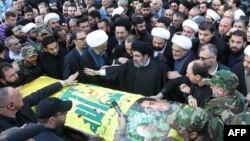Israeli lawmakers say Israel will not tolerate Iranian-backed Shiite fighters remaining near its northern frontier with Syria, signaling Israeli suspicion of Russian assurances that Iranian forces have left the area.
In an interview with Russian state-run news site Sputnik published Friday, opposition lawmaker Ksenia Svetlova of the Zionist Union party expressed concern that “Iranian militia and advisers may be in the ranks of the Syrian Army, including in the Golan Heights.” She said Israel would deem such a presence “absolutely unacceptable” and an “act of aggression.”
In earlier remarks to Israeli radio Wednesday, Israeli Regional Cooperation Minister Tzachi Hanegbi, a lawmaker for the ruling Likud Party, said the government will not accept Hezbollah, an Iranian-financed Lebanese militant group, establishing a new front on Israel’s northern boundary with Syria.
“This is something that is dangerous. If we don’t prevent it today, when still at its outset, it will exact a heavy price of us down the line,” he said.
Russia: Iranian forces out
Hanegbi and Svetlova were responding to Russia’s Wednesday announcement that Iranian forces had withdrawn their heavy weapons in Syria to a distance of 85 kilometers from the Israeli-occupied western sector of the Golan. Russian state news agency TASS quoted Russian special envoy to Syria Alexander Lavrentiev as saying “The Iranians withdrew (from the area) and the Shiite formations are not there.”
But, Lavrentiev also said Iranian military personnel whom he described as “advisers” could be among Syrian government forces who remain closer to the Israeli-controlled Golan.
Israel has pressed Russia for months to persuade Iran to remove its forces from Syria, where both Russia and Iran have sent military resources to help Syrian President Bashar al-Assad fight a seven-year civil war. Israel sees Iran’s presence in Syria as an existential threat because Iranian leaders long have called for Israel’s destruction and described their involvement in the Syrian conflict as a means to that end.
Russia has resisted the Israeli demand, saying it cannot compel Iran to leave Syria, whose leader Assad has welcomed the Iranian support in his battle with rebels.
Hezbollah in Syria
Hezbollah has been fighting alongside Assad’s forces for years. The head of its executive council, Hashem Safi al-Din, said last month the group was part of Assad’s offensive to oust rebels from southern Syrian territory bordering the Israeli-held Golan. The rebels were defeated earlier this week.
Speaking in the Lebanese town of Nabatieh in a televised July 21 speech monitored by several research groups including the Israel Intelligence Heritage and Commemoration Center, Safi al-Din said: “The resistance [Hezbollah] has a presence in the campaign in south Syria, and those who will retreat are American and Israeli collaborators [i.e., rebel organizations].They are the ones who will leave south Syria today and tomorrow. … The resistance [Hezbollah] has not left south Syria [in particular] and Syria [in general].”
Russia has not explicitly stated its position toward the Hezbollah presence on the Syrian-controlled side of the Golan, a presence that the group itself had not publicly disclosed until Safi al-Din’s speech. But Moscow has refrained from publicly criticizing occasional Israeli air strikes targeting what Israel believes to be Iranian bases in Syria or weapons shipments destined for Hezbollah forces in neighboring Lebanon.
This report was produced in collaboration with VOA’s Persian Service.






